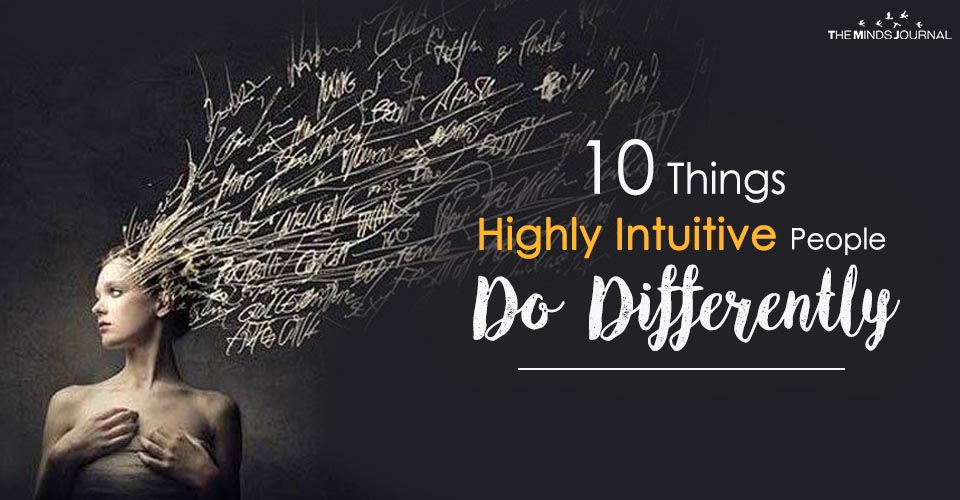Intuition is challenging to define, despite the huge role it plays in our everyday lives. Steve Jobs called it, for instance, “more powerful than intellect.” But however we put it into words, we all, well, intuitively know just what it is.
Pretty much everyone has experienced a gut feeling — that unconscious reasoning that propels us to do something without telling us why or how. But the nature of intuition has long eluded us and has inspired centuries’ worth of research and inquiry in the fields of philosophy and psychology.
“I define intuition as the subtle knowing without ever having any idea why you know it,” Sophy Burnham, bestselling author of The Art of Intuition, tells The Huffington Post. “It’s different from thinking, it’s different from logic or analysis … It’s a knowing without knowing.”
Our intuition is always there, whether we’re aware of it or not. As HuffPost President and Editor-in-Chief Arianna Huffington puts it in her upcoming bookThrive:
Even when we’re not at a fork in the road, wondering what to do and trying to hear that inner voice, our intuition is always there, always reading the situation, always trying to steer us the right way. But can we hear it? Are we paying attention? Are we living a life that keeps the pathway to our intuition unblocked? Feeding and nurturing our intuition, and living a life in which we can make use of its wisdom, is one key way to thrive, at work and in life.
Cognitive science is beginning to demystify the strong but sometimes inexplicable presence of unconscious reasoning in our lives and thought. Often dismissed as unscientific because of its connections to the psychic and paranormal, intuition isn’t just a bunch of hoo-ha about our “Spidey senses” — the U.S. military is even investigating the power of intuition, which has helped troops to make quick judgments during combat that ended up saving lives.
“There is a growing body of anecdotal evidence, combined with solid research efforts, that suggests intuition is a critical aspect of how we humans interact with our environment and how, ultimately, we make many of our decisions,” Ivy Estabrooke, a program manager at the Office of Naval Research, told the New York Times in 2012.
Here are 10 things that people in touch with their intuition do differently.
1.They listen to that inner voice.
“It’s very easy to dismiss intuition,” says Burnham. “But it’s a great gift that needs to be noticed.”
The No. 1 thing that distinguishes intuitive people is that they listen to, rather than ignore, the guidance of their intuitions and gut feelings.
“Everybody is connected to their intuition, but some people don’t pay attention to it as intuition,” Burnham say. “I have yet to meet a successful businessman that didn’t say, ‘I don’t know why I did that, it was just a hunch.’”
In order to make our best decisions, we need a balance of intuition — which serves to bridge the gap between instinct and reasoning — and rational thinking, according to Francis Cholle, author of The Intuitive Compass. But the cultural bias against following one’s instinct or intuition often leads to disregarding our hunches — to our own detriment.
“We don’t have to reject scientific logic in order to benefit from instinct,” says Cholle. “We can honor and call upon all of these tools, and we can seek balance. And by seeking this balance we will finally bring all of the resources of our brain into action.”
2.They take time for solitude.
effective way. Just as solitude can help give rise to creative thinking, it can also help us connect to our deepest inner wisdom.
Intuitive people are often introverted, according to Burnham. But whether you’re an introvert or not, taking time for solitude can help you engage in deeper thought and reconnect with yourself.
“You have to be able to have a little bit of solitude; a little bit of silence,” she says. “In the middle of craziness … you can’t recognize [intuition] above all of the noise of everyday life.”
3.They create.
“Creativity does its best work when it functions intuitively,” writes researcher and author Carla Woolf.
In fact, creative people are highly intuitive, explains Burnham, and just as you can increase your creativity through practice, you can boost your intuition. In fact, practicing one may build up the other.
4.They practice mindfulness.
Meditation and other mindfulness practices can be an excellent way to tap into your intuition. As the Search Inside Yourself Leadership Institute explains, “Mindfulness can help you filter out mental chatter, weigh your options objectively, tune into your intuition and ultimately make a decision that you can stand behind completely.”
Mindfulness can also connect you to your intuition by boosting self-knowledge. A 2013 study published in the journal Perspectives on Psychological Science showed that mindfulness — defined as “paying attention to one’s current experience in a non-judgmental way” — may help us to better understand our own personalities. And as Arianna Huffington notes in Thrive, increased intuition, compassion, creativity and peace are all wonderful side effects of meditating.
5.They observe everything.
“The first thing to do is notice — keep a little journal, and notice when odd things happen,” Burnham says. You’ll gain a keen sense for how often coincidences, surprising connections, and on-the-dot intuitions occur in your daily life — in other words, you’ll start to tap into your intuition.
6.They listen to their bodies.
Intuitive people learn to tune into their bodies and heed their “gut feelings.”
If you’ve ever started feeling sick to your stomach when you knew something was wrong but couldn’t put your finger on what, you understand that intuitions can cause a physical sensation in the body. Our gut feelings are called gut feelings for a reason — research suggests that emotion and intuition are very much rooted in the “second brain” in the gut.
Read The Power of Self-Care for Sensitive People
7.They connect deeply with others.
Mind reading may seem like the stuff of fantasy and pseudo-science, but it’s actually something we do every day. It’s called empathic accuracy, a term in psychology that refers to the “seemingly magical ability to map someone’s mental terrain from their words, emotions and body language,” according to Psychology Today.
“When you see a spider crawling up someone’s leg, you feel a creepy sensation,” Marcia Reynolds writes in Psychology Today. “Similarly, when you observe someone reach out to a friend, and they are pushed away, your brain registers the sensation of rejection. When you watch your team win or a couple of embrace on television, you feel their emotions as if you are there. Social emotions like guilt, shame, pride, embarrassment, disgust, and lust can all be experienced by watching others.”
Tuning into your own emotions, and spending time both observing and listening to others face-to-face can help boost your powers of empathy, says Reynolds.
8. They pay attention to their dreams.
Burnham recommends paying attention to your dreams as a way to get in touch with your mind’s unconscious thinking processes. Both dreams and intuition spring from the unconscious, so you can begin to tap into this part of your mind by paying attention to your dreams.
“At night, when you’re dreaming, you’re receiving information from the unconscious or intuitive part of your brain,” says Burnham. “If you’re attuned to your dreams, you can get a lot of information about how to live your life.”
9. They enjoy plenty of down time.
Few things stifle intuition as easily as constant busyness, multitasking, connectivity to digital devices, and stress and burnout. According to Huffington, we always have an intuitive sense about the people in our lives — on a deep level, we know the good ones from the “flatterers and dissemblers” — but we’re not always awake enough to our intuition to acknowledge the difference to ourselves. The problem is that we’re simply too busy.
“We always get warnings from our heart and our intuition when they appear,” she writes in Thrive. “But we are often too busy to notice.”
10. They mindfully let go of negative emotions.
Strong emotions — particularly negative ones — can cloud our intuition. Many of us know that we feel out of sorts or “not ourselves” when we’re upset, and it may be because we’re disconnected from our intuition.
Read 8 Tips To Strengthen The Voice Of Your Intuition
“When you are very depressed, you may find your intuition fails,” says Burnham. “When you’re angry or in a heightened emotional state … your intuition [can] fail you completely.”
The evidence isn’t just anecdotal: A 2013 study published in the journal Psychological Science showed that being in a positive mood boosted the ability to make intuitive judgments in a word game.
Written by Carolyn Gregoire
That’s not to say that intuitive people never get upset — but your intuition will fare better if you’re able to mindfully accept and let go of negative emotions for the most part, rather than suppressing or dwelling on them.









Responses
3.5